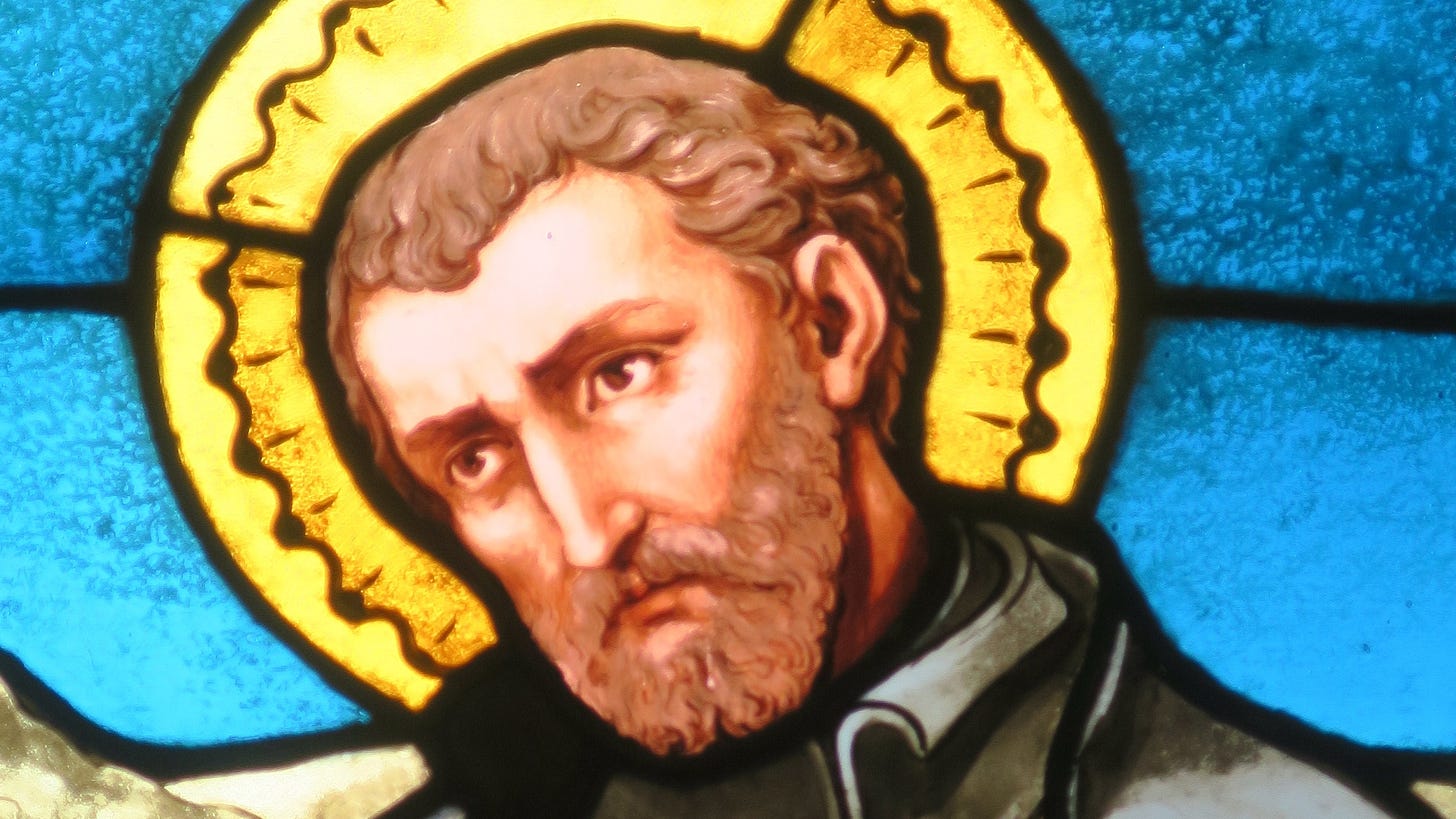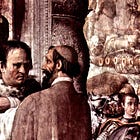Denouncing heretics "... according to the mind of St Alphonsus" – Scavini 1869
"Any person, if they know someone to be an heretic or suspected of heresy, is obliged to report them."

Quick Announcement:
We have launched chat space for The WM Review subscribers. You can access it here:
Get the app by clicking this link or the button below. You can also access chat on the web.
Open the app and tap the Chat icon. It looks like two speech bubbles in the bottom bar. You’ll see a row for the chat inside. See you there.
Denouncing heretics "... according to the mind of St Alphonsus" – Scavini 1869
Editors’ Notes
See also: Part I – Recognising Heretics
This is the second of two texts taken from Pietro (or “Petro”) Scavini’s work, Theologia moralis universa ad mentem S. Alphonsi (The whole of moral theology according to the mind of St Alphonsus).
Scavini was an Italian moral theologian an seminary teacher who lived 1791-1869.
His general faithfulness to St Alphonsus was disputed and defended respectively, but this is not important here. Even aside from this question, the two sections we are publishing bear witness against a false idea.
That ideas is that Catholic theology holds that heresy cannot be recognised without an authoritative declaration from authority.
In the previous part we saw three “rules“ by which one may recognise heretics.
This part, which comes before it in the text, contains Scavini’s treatment of when the duty to denounce someone as a heretic applies. The duty of this denunciation was based on the common good, as well as the good of the individual heretic himself.
But as we asked previously: what is the use of rules for recognising heretics, if we already know that all heretics who deny their state are merely occult until declared otherwise by authority?
And can one denounce someone as a heretic – as opposed to merely suspect of heresy – without first recognising that he is a heretic?
Not that all heretics can be recognised as such, of course. That is not the point.
But on the contrary, the texts presume throughout that one may know someone to be a heretic prior to such a declaration, and give the lie to such facile claims.
Theologia Moralis Universa – ad mentem S. Alphonsi M. De Ligorio
Petro Scavini
Liber Secundus
Mediolani: Apud Ernestum Oliva edit.-Bibliop, 1889
pp. 637-39
Translated by a friend of The WM Review. We have added some line breaks and headings for readability.
Q: Whether heretics are to be denounced?
R: Any person of whatever dignity and rank, if they know someone to be an heretic or suspected of heresy, is obliged under pain of mortal sin to report them to the Bishop or Inquisitor according to the Constitution Noveritis of Pope Nicholas III (year 1280).
Devoti states that this is in accordance with the Apostle's precept and the laws by which every well-constituted society is governed: for the Apostle's precept is that we observe those who cause dissensions and offences and lead astray the hearts of the innocent.
However, the laws of every well-constituted society require every citizen to inform the magistrate if anyone endeavours to commit harmful acts, incite disturbances, or intend ruin.
But should not what is permissible for civil society to do against its traitors be permissible for the ecclesiastical society to do against all heretics, who bring it into extreme danger?
According to the cited Constitution, denouncing should be done under penalty of excommunication ferendae sententiae. However, according to the Decrees of the Holy Roman Inquisition of January 3, 1623, and March 10, 1677, those who do not denounce are automatically excommunicated and the penalty is reserved.
Nevertheless, after the denunciation is made, any confessor can absolve those who have neglected it, as later decrees have determined. This denunciation must be made within thirty days of becoming aware of the heretic, according to the decree of the Sacred Inquisition in the year 1677:
Before the report, fraternal correction should be attempted, when it concerns the public good; and even though heresy may not be proven, it must be denounced, because Alexander VII condemned the proposition: “even if it is evident that Peter is a heretic, you are not obliged to report if you cannot prove it”: therefore, even if the offence is occult, it must be reported.
Because even though the judge cannot proceed immediately to a particular inquisition, he can nevertheless investigate, scrutinize, and thus acquire knowledge of the matter, as Suarez notes.It must be reported, even if the crime of heresy is known under natural secrecy or under oath not to reveal it. Natural secrecy must be observed for the private good; whereas the manifestation of heresy is for the public good.
Nor does the oath prevent reporting, for if it were binding, it would be against good morals; since heresy is a pest that spreads like cancer and always leads to common spiritual harm.It must be reported even if the heretic is dead or reformed, because perhaps he corrupted others with his heresy or was himself corrupted by others.
Also even if the heretic has already been reported by others, because he is more easily convicted as guilty by multiple witnesses. Indeed, the reporting is necessary even if he is only an aider or abettor of heretics.
We have said 1: Or suspected of heresy: where we note that many crimes once caused suspicion of heresy, as can be seen from the Constitutions of Urban VIII, Clement VIII, Gregory XIII and XIV, and Benedict XIV and from the Decree of the Holy Inquisition.
Nevertheless, due to either contrary custom or because it is considered nearly impossible in today's customs for reporting to always be useful; therefore, it is now generally accepted only to report the following as suspected of heresy:
Confessors soliciting immoral acts; or breaking the seal, if they (according to the more common and probable opinion) due to a doctrinal error hold that it does not bind or not so strictly. The Salmanticenses also extend it to priests celebrating Mass multiple times a day, or without having fasted;
Those bound by a solemn vow, if they contract marriage;
Those guilty of simultaneous polygamy;
Secular individuals [simulating] celebrating Mass or hearing Confessions;
Superstitious individuals, if superstition is with a knowledge of sin and casts true suspicion of heresy, as happens if sacred things are involved, e.g., holy oil, a consecrated Host; or if an effect arises from superstition; or if someone instructs others expressly in superstition. Likewise, if an explicit pact is made with a demon, or if a demon is worshiped: but when only an explicit invocation of a demon is involved, there is debate about the obligation to report;
Blasphemous heretics;
Those who dissuade others from reporting heretics unless it is done out of friendship; likewise, those who neglect to report heretics, if it is their duty to report them;
Individuals who give their names to clandestine sects.
We have said 2: Speaking generally, unless it concerns heresiarchs and heretical dogmatizers who are always to be reported, so that Bishops may take precautions as much as possible, since heresy is such a harmful pest that it is difficult to remedy once it has taken root.
As for others, whether heretics or suspected of heresy (even Freemasons), there is not always an urgent obligation to report them. It is commonly taught that one can omit reporting in the following cases:
When it concerns reporting oneself; because no one is obliged to expose their own depravity. Therefore, even when it concerns reporting an accomplice, if it cannot be done without reporting oneself;
When reporting would cause a serious inconvenience, as defined by the Sacred Congregation on January 22, 1727. Hence neither the brother must denounce the sister nor the father his son, because nature recoils from this, and it would be a disgrace to oneself. Nevertheless, understand this [as being] if there is no danger of common harm, which always prevails over our own good;
When there is no hope of punishment; since no one is obliged to do a useless work: as would be the case in places where Catholics are mixed with heretics, or where (as the renowned Alasia says) there is such a multitude of bad opinions about religion that the authorities can hardly punish them, as is almost always the case today in every region.
However, this does not apply to ecclesiastics who are heretics or suspected of heresy; for Bishops can more easily deal with them and prevent spiritual harm to the people; therefore, in all cases, we think they should be reported.
HELP KEEP THE WM REVIEW ONLINE!
As we expand The WM Review we would like to keep providing free articles for everyone. If you have benefitted from our content please do consider supporting us financially.
A subscription from you helps ensure that we can keep writing and sharing free material for all.
Plus, you will get access to our exclusive members-only material!
Thank you!
Further Reading:






So what are we to do when the Bishops have lost their heads?